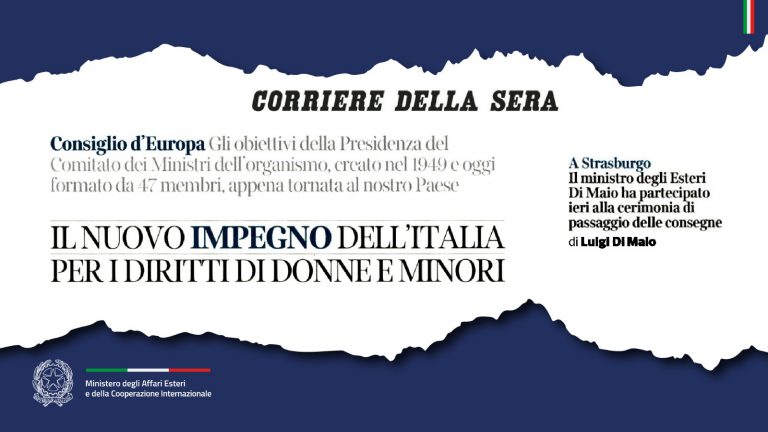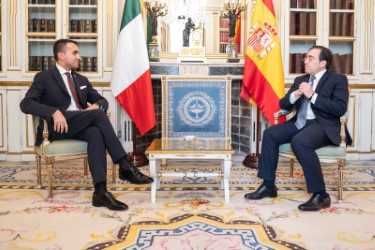“Relations between Italy and Germany are very important and constantly caring for them is one of the priorities of our foreign policy.” This is the statement made by Enzo Moavero Milanesi, the Minister of Foreign Affairs and International Cooperation, in renewing his heartfelt wishes for the recent celebration of the German National Day, retracing the close relations that the Governments of the two Countries had over the past few months. He said: “Our relations have been close and spontaneous because the destinies of our two peoples have always been intertwined. Through the centuries, the Italian and German cultures have nurtured each other, giving rise to a peculiar communion: in the arts – figurative, literary and musical; in religious ferment; in all the branches of science; in the schools of thought in the field of law, economics, history and philosophy. Today, Germany and Italy share the responsibility of being the Founding States of the European Communities and of the European Union. They are aware of the role that stems from these founding decisions of their respective democracies following two terrible world wars, which were also a long and bloody civil war between Europeans. Moreover, the two Countries represent Europe’s uniquely complementary first- and second-largest manufacturing sectors and have, between them, enormous trade volumes of great value added. Also for this reason, we have had frequent contacts, carefully coordinated on both sides, pursued in the awareness of our mutual interest in nurturing and developing them.”
This is the spirit in which, on 5 October, Minister Moavero received at the Farnesina Norbert Lammert, former President of the Bundestag and currently chairman of the Konrad Adenauer Foundation, which is linked to the party of Chancellor Angela Merkel. During their fruitful conversation, they reviewed the main issues currently debated in Europe and the key challenges of the presently complex EU context, and agreed on the need for a decisive European action to definitively resolve the negative fallout of the economic crisis and govern the epochal migration flows. The exchange of visits between the Foreign Minister of Italy and of Germany, Heiko Maas, is constant. Last July, they had an in-depth working meeting in Berlin and systematic bilateral meetings were organised in the sidelines of the sessions of the EU Council, the NATO summit and, more recently, at the UN General Assembly. On 30 September, they meaningfully went together to Marzabotto, to attend the ceremony in remembrance of and in tribute to the many victims of the horrible massacre perpetrated in Monte Sole in 1944. The emotions raised by the place that symbolizes the atrocities of World War II offered both ministers the opportunity to reaffirm their solemn commitment towards “the peace and loyal cooperation between European nations and peoples which has constituted the deep but often underestimated essence of the European integration process for almost 70 years,” said Minister Moavero. Their talks consistently focus on the different profiles of common security policies and the initiatives to be taken on migrants in a context of a well-structured and effective burden-sharing at EU level.
On 4 October, the German Minister of State for Europe, Michael Roth, came to the Farnesina to meet with Minister Moavero. The two ministers meet monthly at the EU General Affairs Council which addresses relevant horizontal issues for the activities of the European Union such as the Multiannual Financial Framework for 2021-2027, the so-called Brexit and the enlargement of the European Union. The Rome meeting made it possible to make a fruitful all-round overview and to focus their commonality of views on the advisability of raising innovative resources to allocate to the EU budget, and on policies aimed to efficiently foster a socio-economic balance consistently with the European values of solidarity. Equally in-depth and cordial were also the meetings held with several members of the German Parliament that Minister Moavero had in Berlin in July and subsequently the meeting in Rome, on 3 October, with Gunther Krichbaum, chair of the Committee on European Union Affairs of the German Bundestag. In every one of these meetings, the focus was on the excellent climate and the thorough understanding and collaboration on issues of economic growth, boosting employment rates, sustainable development, environmental protection, social and security policies, and combating terrorism and international organised crime. All of the aforesaid meetings highlighted the numerous consonances between Rome and Berlin, both on key issues and in bilateral relations, and on EU policies. The respective Governments agree on the need for debate and to seek the best possible solutions to tangibly meet everyone’s needs, harmonizing them towards common goals. This is the reason why the two Foreign Ministers wish to work together to find new, stable and structured forms of dialogue in an adequately organised framework capable of singling out the points of convergence on key decisions and of addressing – immediately and together – every point that needs to be further analysed because of a diverging initial view of the matter.



